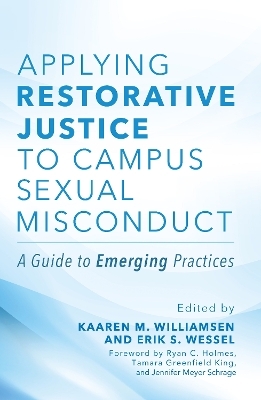
Applying Restorative Justice to Campus Sexual Misconduct
Routledge (Verlag)
978-1-64267-385-2 (ISBN)
Kaaren M. Williamsen is Director of PEAR (Prevention Education, Assistance & Resources) in the Equity, Civil Rights, and Title IX Office at the University of Michigan. PEAR is a new 7-person office focused on providing prevention and policy education for faculty and staff, as well as by providing assistance to all 19 schools and colleges as they holistically respond to sexual misconduct in their communities. She has also served as Director of SAPAC (Sexual Assault Prevention and Awareness Center) at the University of Michigan. Prior to U-M, she served as the Title IX Coordinator at Swarthmore College, and was the founding director of the Gender and Sexuality Center at Carleton College, where she also served as a Deputy Title IX Coordinator. Kaaren has masters’ degrees in women’s studies (Minnesota State, Mankato) and counseling and student personnel psychology (University of Minnesota, Twin Cities); she holds a Ph.D. in organizational leadership, policy, and development from the University of Minnesota. She is a co-founder of Campus PRISM (Promoting Restorative Initiatives for Sexual Misconduct) and is a restorative justice facilitator trainer and consultant. Erik S. Wessel is the Director of the Office of Student Conflict Resolution (OSCR) at the University of Michigan. OSCR is a multi-disciplinary office which employs a spectrum model of restorative resolution pathways for campus community conflict and accountability. It is in this role that he has collaborated on the development and effective implementation of Adaptable Resolution pathways for Sexual and Gender-based misconduct, as well as building effective psychoeducational intervention tools responsive to sexual and gender-based educational needs. Erik holds a Doctor of Education degree in Higher Education Administration from Penn State University with specialization in Counselor Education. Prior to joining the OSCR team in 2015, Erik served as the Director of the Office of Student Conduct at Ferris State University and worked in student conduct and Residence Life at Penn State University.
Foreword Introduction Part I Philosophy and Getting Started 1. A Restorative Justice Approach to Campus Sexual Misconduct. Restorative Guideposts and Insights from Early Adopters 2. Building Restorative Principles into Campus Policies 3. What About Due Process? Addressing Common Concerns and Questions about Using Restorative Justice in Cases of Campus Sexual and Gender-Based Misconduct Part II Process and Intervention 4. Building Restorative Options 5. When Informal Is Formal. Procedural Documents, MOUs, Agreements, and Administrative Case Management Considerations 6. Specialized Interventions for Addressing Problematic Sexual Behavior Part III Facilitation Focus 7. Embodying a Restorative Approach. Attending to the Complexities of Restorative Justice for Campus Sexual Misconduct 8. Facilitating Repair and Restoration. Guiding Restorative Practices with Those Who’ve Experienced and Caused Sexual Harms 9. Healing through Supported Dialogue. A Reflection and Three Case Studies Part IV Reflections on Implementation 10. Adaptable Resolution. Where Justice and Healing Meet 11. Reflections on Starting a Restorative Justice Program 12. System-Aware Considerations for Restorative Responses to Campus Sexual Misconduct 13. Implementation of Institutionally Facilitated Restorative Justice Approaches to Campus Sexual Harm 14. Practitioner Reflection 15. Case Study. Restorative Justice for Campus Sexual Misconduct 16. Reflections on Piloting a Process 17. Observations and Reflections From a Restorative Justice Process Participant 18. Reflection – STARRSA AP Implementation Recommendations 19. Transformation 20. Practitioner Reflection on the Ripple Effects across Communities Appendix A Editors and Contributors Index
| Erscheinungsdatum | 16.10.2023 |
|---|---|
| Verlagsort | New York |
| Sprache | englisch |
| Maße | 152 x 229 mm |
| Gewicht | 510 g |
| Themenwelt | Medizin / Pharmazie ► Medizinische Fachgebiete ► Psychiatrie / Psychotherapie |
| Sozialwissenschaften ► Pädagogik ► Bildungstheorie | |
| Sozialwissenschaften ► Pädagogik ► Erwachsenenbildung | |
| Sozialwissenschaften ► Soziologie | |
| ISBN-10 | 1-64267-385-4 / 1642673854 |
| ISBN-13 | 978-1-64267-385-2 / 9781642673852 |
| Zustand | Neuware |
| Informationen gemäß Produktsicherheitsverordnung (GPSR) | |
| Haben Sie eine Frage zum Produkt? |
aus dem Bereich


